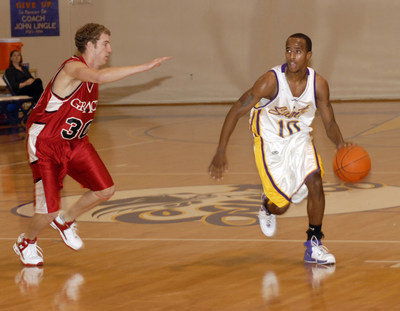In the world of sports and competition, March Madness holds a special place. With the 2015 NCAA men's basketball tournament kicking off Tuesday, March 17, millions of Americans are getting ready to take part in the chaotic tradition of betting on teams and fueling rivalries with colleagues, friends, and family. But what's behind this synchronized frenzy?

Dr. Pamela Vincent, psychology faculty at Ashford University, offers insight into the manic behavior that led to the term March Madness:
It's Only Natural – Humans have an innate drive toward competition, a leftover trait stemming from times when it was necessary to compete for food, shelter, and mates in order to survive. Although the need to hunt for food and safety aren't there to the same extent today (in most cases), we still enjoy that competitive spirit when it comes to things like sports.
A Slam Dunk – It's easy to throw $5 into an office pool during March Madness because there's the outside chance that you might win the whole pot without really having to do any hard work. It's even easier to understand why the person who won last year (or the person who is just coming down from the office's fantasy football season win) would throw some money into the game. He or she has already seen the rewards for joining in, and is therefore reinforced to try their luck again. Reinforcement, taken from the behavioral psychology perspective, suggests that when a behavior is rewarded, we are more likely to repeat it. So, if you take a gamble on a game and win, you are more likely to gamble on the next game.
The Thrill of the Chase – Betting is based on a variable partial reinforcement schedule, meaning that you can't really predict when you'll be rewarded again. Imagine that you knew you'd win every third year. Well, there's really no reward in playing during years one, two, four, or five because you know you won't earn a return on your investment. But with betting, you never know which bracket will be your lucky one or which year your team will to make it to the end, so you are even more likely to compete due to the inconsistent reward system.
The Ball's in My Court – So why do those who have no real stake in the games and perhaps choose teams based on fun mascots or colorful uniforms get involved in the tradition? First, if you are competing within a small office, you may be influenced by the "availability heuristic," which suggests that we tend to overestimate our likelihood of winning. You see 30 people in your office and figure, "Well, somebody has to win – why not me?" For the notorious annual "losers" who over-analyze, pick all of the wrong upsets and end up with only three out of the top 32 each year, there is the "gambler's fallacy" in which a person feels that he or she is overdue for a win despite all other factors in the game.
Very Superstitious – Another interesting aspect of gambling during March Madness is the superstition that comes into play. This behavior ranges from wearing the same socks while watching a favorite team to making your friend leave the room so your team can score. Logically, we know that these behaviors have absolutely no effect on whether or not a foul shot is made or a rebound is caught but when things occur outside of our control, we either choose to avoid the anxiety-producing events or establish methods of coping with them. In other words, we can't control whether or not a player will make that foul shot, so we cope with the anxiety of not being able to control the situation by creating our own semblance of control and finding the most rational or predictable element in our environment.
So, will drinking a chocolate shake during every game help someone finally win this year? "Not likely," said Vincent. "But hey, there's no bad excuse for a chocolate shake and just maybe this time you'll have the lucky bracket."
About Ashford University
Where heritage meets innovation – that's Ashford University. At Ashford, students discover relevant degree programs, innovative technology, and cherished tradition. Ashford offers associates, bachelor's, and master's online degree programs, while the Clinton, Iowa campus offers bachelor's programs. Whether on campus or online, Ashford students enjoy the same supportive community. For more information, please visit www.ashford.edu, www.facebook.com/ashforduniversity, www.twitter.com/AshfordU, or call Shari Winet, Vice President of Public Relations, at 858.513.9240 x2513.